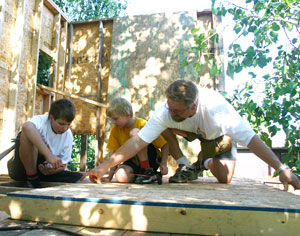
Involve and Challenge Me and I Learn!
An old adage states: “Tell me and I forget, show me and I remember, involve me and I understand.” I like to take this a step further by adding “challenge me and I learn.”
Even though I have taught thousands of students at a variety of institutions I hesitate to call myself a professor, teacher, or instructor. I would rather be called a learning facilitator. This is really NOT a matter of semantics but is fundamental to understanding the significance of constructivism, active learning, inquiry-based learning, and learner-centered education as a whole.
Teaching, or to teach, is to impart knowledge or skill to someone by instruction or example; or to give lessons in a subject. In contrast, learning, or to learn, is coming to know something, to acquire knowledge, or to find something out. Therefore a teacher is a person who imparts knowledge or skill through instruction or example while a learning facilitator is one who creates an environment in which someone can come to know something, acquire knowledge, or gain information and experience.
The significance in these definitions and the realization of what happens when we teach as opposed to facilitating learning is that a teacher by definition is focused on themselves and their ability to impart knowledge. The saying “sage on the stage” is extremely appropriate in this context. In contrast, a learning facilitator is focused on the learner and on creating a desirable environment in which the learner can come to know, acquire knowledge or make a meaningful connection–“a guide on the side.”
Learning is an active and dynamic process in which learners construct new ideas or concepts based upon their current/past knowledge. The making of meaningful connections is key to learning and knowing.
We need to move from the passive educational environment of main lecture points, rubrics, individual competition, and standardized testing to an active educational environment of interactive presentations, critical and analytical thinking, collaboration, and meaningful projects.
The above principles of learning are practically realized in Inquivisitism which constructivist fundamentals include:
- Fear removal
- Stimulation of Inquisitiveness
- Getting started fast
- Using the system to learn the system
- Discovery learning
- Modules can be completed in any order
- Supporting error recognition and recovery
- Developing optimal training designs
- Forum for discussion and exploiting prior knowledge
- Real-world assignments
When you combine these fundamentals with a purposeful design to build a holistic student-centered learning environment we can create significant learning environments that will help our learners learn how to learn and grow into the people we all hope they will become.
This really isn’t a new concept. We design information systems, smart buildings, ecological friendly communities, and so many aspects of our society but we, unfortunately, do not apply this holistic approach to designing learning environments. Whether we are purposeful in its design or we just allow the circumstances to dictate its development, schools, colleges, and universities are providing learning environments for their students.
Rather than allow the environment to come together inadvertently and respond reactively to the learning dynamics that arise I suggest that educators become proactive and create significant learning environments that inspire, foster, and facilitate deeper learning. The following mandala highlights the components that we need to consider when we are creating significant learning environments:
This summary of my learning philosophy represents several decades of evaluation, analysis, and synthesis and is better understood in the context of the following research and exploration:
Research that informs my Learning Philosophy
Inquisitivism
CSLE+COVA
Learner’s Mindset
Professional Learning Plan
Educational Development Philosophy
Supplemental Educational Development Practice Examples
Revised November 2021





























